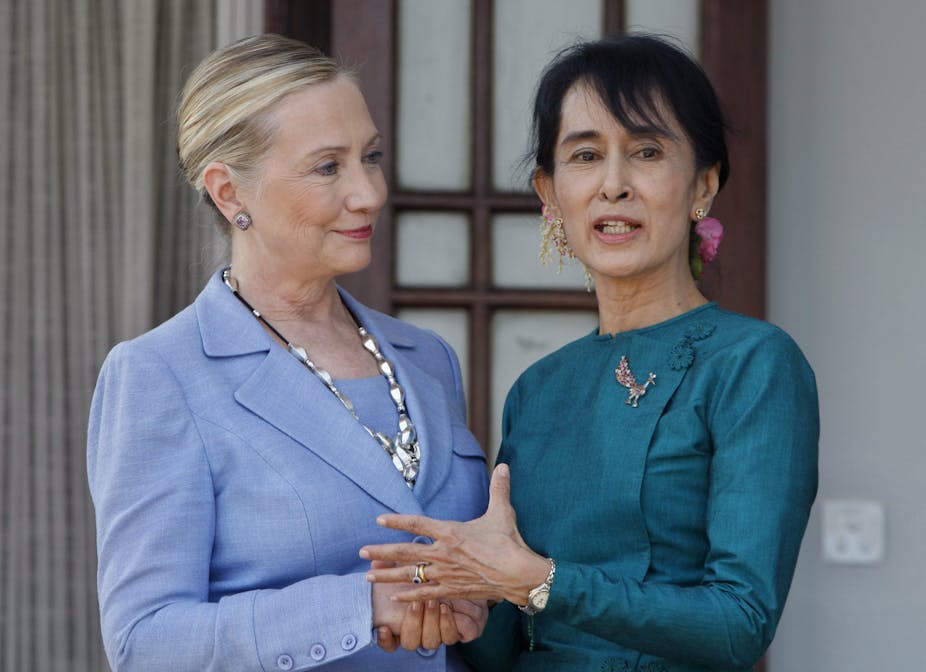In a landmark development, Aung San Suu Kyi recently confirmed she would run in by-elections to be held in Burma on April 1, 2012.
Until now, Suu Kyi has not been allowed to stand for election. When the past two elections were held in 1990 and 2010, she was under house arrest. Her party, the National League for Democracy (NLD) won a majority of seats in the 1990 elections, but rejected the option of participating in the 2010 elections while its leader was still under house arrest.
Real reform or window dressing?
The April 1 by-elections will test the Myanmar Government’s commitment to genuine political reconciliation.
Suu Kyi’s decision follows unexpected concessions by the Myanmar Government to amend the election law. By standing in the by-elections, Suu Kyi effectively endorses the Myanmar Government’s political reforms in a way that some of her supporters would be uncomfortable with, but nonetheless will be very welcome for many in the country.
The whole world will now be closely watching the conduct of these by-elections in 48 seats, as they are expected both to be “free and fair”, as well as a test of Suu Kyi’s true standing. The Myanmar government has already acknowledged the by-elections need to be better conducted than those in 2010, and they would be foolish if they tried to rig these elections. The government could go further and immediately announce that international election observers and journalists would be permitted on this occasion.
Change can only come slowly
The international community and Burmese democracy supporters need to be realistic about what these by-elections can achieve. The by-elections cannot change the overall balance of parties in the three-tiered assemblies elected in the 2010 elections, which will continue to be dominated by the government-backed Union Solidarity and Development Party, of which President (and former general) Thein Sein is the head.

It is not clear how Suu Kyi will fulfill her new role once she is elected as a member of the People’s Assembly. Formally, she will be just one elected member out of many, although the President’s main political advisor has publicly suggested she could become chair of a parliamentary committee.
In some ways, she could find herself playing a smaller role than when she was outside the assembly, since in Burma, as in most countries, there is no formal position of “leader of the opposition”.
Creating a role for the opposition
The Myanmar Government might continue to acknowledge her de facto role and allow Suu Kyi to undertake a variety of political activities inside and outside parliament. They would be unwise to constrain her political role or use pretexts to stifle or unduly restrict her freedom.
Even if she is allowed to function relatively freely in the period ahead and even if she remains the focus of independent political activity, there will be limits to what Suu Kyi can accomplish on her own to bring about change.
She could certainly play a significant role guiding the pace and direction of change, and will no doubt continue to press the Myanmar government to initiate further reforms. She will probably seek to do this constructively, and to some extent in cooperation with the government, as she has done since her release in November 2010. So far this appears to have paid off for all concerned.
Supporting change
If this constructive, informal “government of national unity” approach can be sustained, and if progress can gradually be made on remaining political and economic problems – including the ongoing ethnic insurgency, political prisoners and continuing human rights abuses – Burma will have turned the corner in its transition.
It will be up to the Burmese people, with the support of the rest of the world, to find ways to assist and encourage this gradual process of change for even better results.
One challenge will be how, and when, to ease international sanctions so as to encourage and protect reforms. Leaving all sanctions in place while the Myanmar Government introduces real improvements is not enough.
Australia led the way this week by reducing some of its sanctions, braving criticism from pro-democracy activists who oppose any easing sanctions even though much change has happened.

